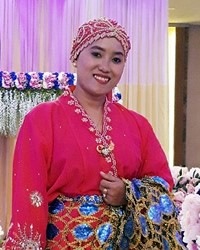Tausug, Moro Joloano in Philippines

Photo Source:
Johanry - Wikimedia
Creative Commons
|
Send Joshua Project a map of this people group.
|
| People Name: | Tausug, Moro Joloano |
| Country: | Philippines |
| 10/40 Window: | No |
| Population: | 1,388,000 |
| World Population: | 1,654,000 |
| Primary Language: | Tausug |
| Primary Religion: | Islam |
| Christian Adherents: | 0.00 % |
| Evangelicals: | 0.00 % |
| Scripture: | New Testament |
| Ministry Resources: | Yes |
| Jesus Film: | Yes |
| Audio Recordings: | Yes |
| People Cluster: | Filipino, Muslim |
| Affinity Bloc: | Malay Peoples |
| Progress Level: |
|
Introduction / History
A number of different people groups, known collectively as South Philippine Muslims, live on the Sulu Archipelago, an island chain between the Philippines and the island of Borneo. By far, the Tausug are the most dominant of all the South Philippine Muslim groups. Most of the Tausug reside on the island of Jolo, but some live scattered throughout the other islands. The name Tausug means "people of the sea current." The Tausug probably came to the Sulu Archipelago from northeastern Mindanao as a result of the expansion of Chinese trade in the thirteenth and fourteenth centuries. The exact time Islam was introduced to the Tausug is not known. However, it may have occurred as early as the tenth century A.D. when Arab trade was active with southern China via the islands. Since their conversion to Islam, the Tausug have remained staunch Muslims. They have also shown great determination in their fight for independence from Filipino control.
What Are Their Lives Like?
The livelihood of the Moro Joloano Tausug in the Philippines is based primarily on fishing and small-scale agriculture. In addition, they also raise some animals such as cattle, chickens and ducks. The major cash crops are hemp, coconuts, coffee, and fruit. While some farmers still use a slash and burn method of cultivation, most raise rice in non-irrigated fields. Fishing, whether part or full time, is done from motorized boats in offshore coastal waters. They use nets, hooks and lines, and various types of bamboo traps to fish. Most of the Moro Joloano Tausug live in small coastal communities in the southern Philippines. The smallest territorial unit is the household, and the next largest unit is the village settlement, which often includes related family members. Still larger is the kauman (community), which has a common name and headman. The unity of the kauman depends on such factors as the amount of intermarriage among its members, the effective authority of the headman, and the attendance at a common mosque. This situation reinforces the community need to stick with the Islamic religious system. The typical Moro Joloano Tausug dwelling is raised six to eight feet above the ground. It generally consists of a rectangular room made of timber and bamboo, with a thatched gable roof. The house is surrounded by a series of elevated porches that lead to a separate kitchen. Usually, a fence is built around it for protection. The ideal marriage among the Moro Joloano Tausug is often arranged by the parents. However, among younger people, courting may occur, and the young people are becoming freer to select their own mates. Parents prefer that they marry first and second cousins, but the younger generation is in the process of broadening their choices. Children sometimes study the Koran with a private tutor, and they have a public ceremony when they are ready to recite the scriptures. Sons are circumcised in their early teens, and there are reports that daughters are "circumcised" at six or seven years of age. Girls help their mothers with household duties, while boys help their fathers in the fields or with fishing.
What Are Their Beliefs?
The Moro Joloano Tausug are Sunni (Orthodox) Muslims belonging to the Shafiite branch of Islam. However, like many other Asian Muslims, they have retained many pre-Islamic religious beliefs and rituals. Their world is full of environmental spirits that are believed to cause sickness or good fortune. Their concept of life after death is a mixture of Islamic and traditional beliefs. For example, they believe that a person has four souls that leave the body after death. It is thought that the body then goes to hell, where his length of punishment is determined by his misconduct while living on earth. Eventually, however, they believe that all Tausug reach heaven.
What Are Their Needs?
The Moro Joloano Tausug have remained staunchly devoted to Islam, with nearly all being Muslim. The New Testament has been translated into their language. Very few will even consider the claims of Christ given the community pressure to remain in the Islamic fold.
Prayer Points
Pray for the Lord to show himself powerful and loving by giving them an abundant harvest this season. Pray for the Moro Joloano Tausug people to understand they cannot attain God's favor through works, but their only choice is to depend on the only sin-forgiving Savior. Pray for Holy Spirit anointed workers to go to the Moro Joloano Tausug people until there is a movement to Christ. Pray for Joloano Tausug disciples who will make more disciples who will make even more disciples.